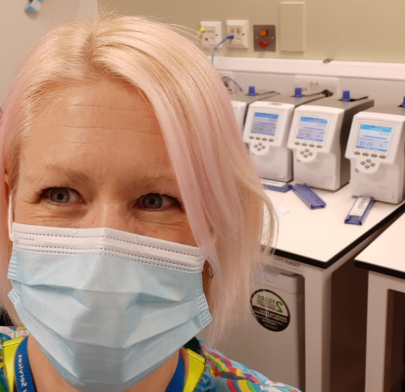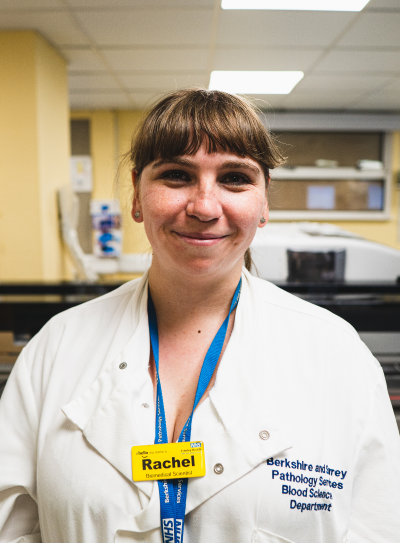15 March 2022
Healthcare Sciences Week runs from 14-18 March and celebrates the work and acheivements of over 50,000 healthcare scientists that work in the NHS.
This week we'll be sharing interviews with three of the fantastic healthcare scientists working at Frimley Health. Fiona, Rachel and Kish.
 Get to know Clinical Scientist Fiona...
Get to know Clinical Scientist Fiona...
What is your profession?
I am a Clinical Scientist in Point of Care Testing.
A Clinical Scientist in pathology forms a bridge between the scientists and activities in the laboratory and the users of those services – doctors, nurses, midwives, therapists, etc. We support the correct use and interpretation of pathology tests performed both in main laboratories and at the point of care, in the diagnosis and monitoring of disease.
What made you want to become a HCS?
Whilst school I considered medicine, but it was the science of medicine that truly interested me, so I studied Physiological Sciences. I later came across the training scheme for Clinical Biochemistry at a careers event. For me it seemed the perfect combination of medicine and science – a chance to use my skills to benefit patients in an arena that suits my interests.
What training and education have you completed to get to your role?
After studying Physiological Sciences for my BSc I decided to do a PhD. (However, the entry requirement for clinical scientist training is Batchelors degree relevant to the chosen discipline.) After this I undertook a 3-year training programme including a Masters degree in Clinical Biochemistry. Following training I passed my assessment and registered as a Clinical Scientist with the HCPC, and over the next few years I took my exams for Fellowship of the Royal College of Pathologists.
Why did you choose to work in the NHS/Frimley?
I chose Frimley because of the reputation of BSPS (the pathology network that provides this service) and how it is leading nationally in implementing new models of delivering pathology.
What is the most rewarding part about your job?
Knowing the benefits that the work of the Point of Care Testing (POCT) team is bringing to patients in allowing timely decision-making, often permitting life-saving interventions to be administered immediately.
By providing clinically-appropriate, high quality, well-managed POC testing capability we are able to empower clinicians to do a more effective job, and patients to get a better experience of care.

Get to know Cardiac Physiologist Kish...
What is your profession?
I am a Cardiac Physiologist / Cardiac Science Practitioner. A cardiac physiologist works in a cardiac investigation unit performing a variety of cardiac tests and we also run the follow-up clinic. We help with prognosis and diagnosis of patients with heart disease.
What made you want to become a Health Care Scientist?
I was first interested in becoming a cardiac physiologist when I was in Mauritius. I was fascinated by coronary angiogram/angioplasty/pacemaker implants and the dynamic of the multi-disciplinary team that work together to perform the procedure. The scientific aspect of the job as well as the patient contact was a bonus as well. It's fantastic being part of the patients’ journey while also contributing to the prognosis and diagnosis of the disease.
What training and education have you completed to get to your role?
As a mature student in my early 30s and being out of education for more than 6 years, I attended college studying Access in Science and I also did my Proficiency in Electrocardiography prior to applying to University of Southampton enrolling on the BSc (Hons) Healthcare Science (Cardiovascular/Respiratory) programme.
Why did you choose to work at Frimley Health?
I needed career progression from my last post and Frimley Health was the right fit. I'd heard a lot of good things about the Trust, including it's outstanding CQC reports. A new place is always a challenge and two years later I am still here and enjoying my role.
What is the most rewarding part about your job?
Making a difference in the patient journey. Being able to carry out various tests, collect data and be able to analyse and produce clinical reports to help other healthcare professionals treating the patients is very much rewarding. Personally, the satisfaction I get being part of a team and helping during emergencies is really rewarding.
What advice do you have for someone who is interested in a role within the fields of healthcare science?
I believe that being a Cardiac Science Practitioner is a very rewarding career and there are several opportunities to excel in different specialisms involving research, teaching and working in clinical and non-clinical environments. Our population is living longer and heart disease is on the rise so being part of the team working to make a difference is brilliant.

Get to know Biomedical Scientist Rachel...
Can you tell us a bit about your profession?
I am a biomedical scientist (BMS) in the biochemistry department in Pathology. My role is to process the blood/urine/fluid samples for the biochemistry tests from GPs, inpatient wards and A&E. I also maintain the analysers and ensure they are functioning correctly throughout the day/night by running quality control material.
What made you want to become a HCS?
I started working as a lab assistant initially when I first started in the lab after finishing my A Levels and I really enjoyed working in the laboratory environment. The opportunity came up to do a funded part time degree in biomedical science so I accepted the offer and completed the degree while working full time in the laboratory.
Why did you choose to work in the NHS/Frimley?
When I left school, I didn’t want to go to uni straight away as I didn’t know what I wanted to study, so I thought I would try working first and see if I find a career path. I didn’t want an office job either so when I saw a hands on role in the NHS in the laboratory I thought it would be a great opportunity. I also live close to the hospital so it allows ease of getting to work and allowing shift working to be easier as I do not have a long distance to travel.
What is the most rewarding part about your job?
Finding abnormal results and contacting the relevant clinician/service about them and then seeing the patient coming into A&E to receive treatment. It is rewarding knowing that my work has resulted in the patient receiving the care and treatment they need quickly, without having to wait to be contacted by their GP or doctor in the morning.
What advice do you have for someone who is interested in a role within the fields of healthcare science?
It can be a demanding environment, particularly with the high workload of samples we put through the laboratory on a daily basis, but it is rewarding knowing you are helping patients behind the scenes. I love where I work as it is busy and I feel sense of achievement by the end of the day as you can see the progress you have made throughout your shift.

